In the Dark Night's Tender Embrace
Some fragmented thoughts on a companionable darkness, poetry, St. John of the Cross, grilled cheese sandwiches, and the music of Ola Gjeilo
Thursday, December 14
Grand Rapids, Mich.
Like so many other kids, I was afraid of the dark. I always had a night light in my bedroom, a dim glow that felt protective. I didn’t know that the darkness in the house was never absolute. If only I’d been patient enough, I might have realized that my body would find the light it needed. If only I’d allowed my eyes to adjust, I might have perceived that the darkness just had to be understood, not feared.
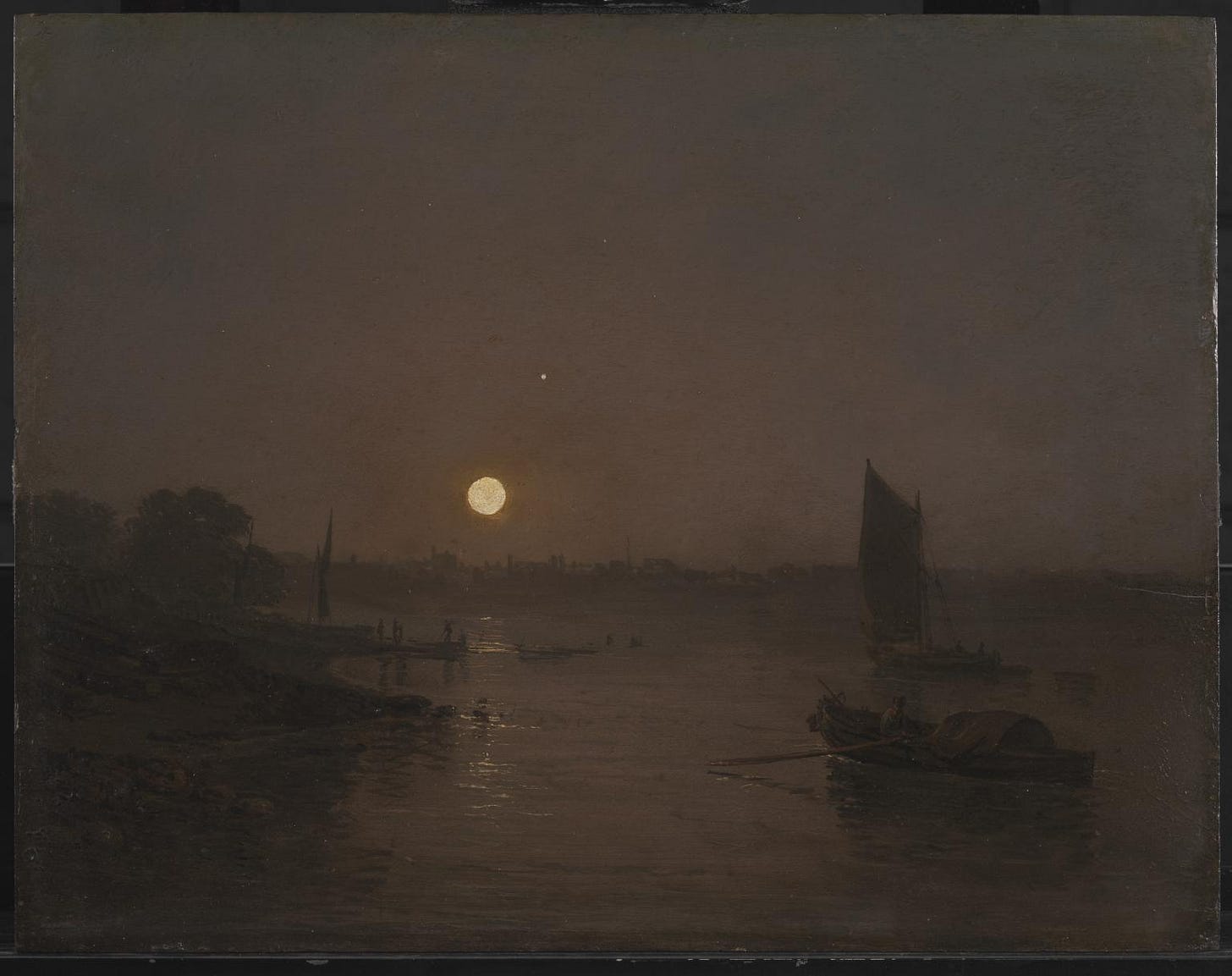
Midway through Advent, as the days grow shorter and the nights grow longer, I’ve been pondering that phrase “the dark night of the soul.” For so many of us, that concept is both so real and so forbidding. I didn’t know until recently it derives from the writings of Juan de Yepes y Álvarez, now better known as St. John of the Cross, a medieval Spanish mystic whose feast day happens to be today. It comes from a poem he wrote in the late 1570s and a treatise called Noche Oscura (“Dark Night”), which he penned some years later to explain it.
John of the Cross did not name the poem. Though it’s often called “The Dark Night of the Soul,” that title was appended later on.
I.
In a dark night,
With anxious love inflamed,
O, happy lot!
Forth unobserved I went,
My house being now at rest.
II.
In darkness and in safety,
By the secret ladder, disguised,
O, happy lot!
In darkness and concealment,
My house being now at rest.
III.
In that happy night,
In secret, seen of none,
Seeing nought myself,
Without other light or guide
Save that which in my heart was burning.
IV.
That light guided me
More surely than the noonday sun
To the place where He was waiting for me,
Whom I knew well,
And where none appeared.
V.
O, guiding night;
O, night more lovely than the dawn;
O, night that hast united
The lover with His beloved,
And changed her into her love.
VI.
On my flowery bosom,
Kept whole for Him alone,
There He reposed and slept;
And I cherished Him, and the waving
Of the cedars fanned Him.
VII.
As His hair floated in the breeze
That from the turret blew,
He struck me on the neck
With His gentle hand,
And all sensation left me.
VIII.
I continued in oblivion lost,
My head was resting on my love;
Lost to all things and myself,
And, amid the lilies forgotten,
Threw all my cares away.
I’ve long feared poetry much like I once feared the dark—impatiently and without understanding. Some of this goes back to the ninth grade, when we were forced to both read and write poetry. I didn’t want to get it wrong, or to sound stupid, or to risk vulnerability, in my reading or in my writing. Instead, I just said I didn’t like poetry.
Part of the freedom I’ve found in returning to the genre comes from giving myself permission to feel whatever I feel in response to the lines. If it doesn’t make sense to me, it doesn’t make sense to me—and there’s no shame in that anymore. (I haven’t healed from high school enough to write poetry yet.) So here’s my sophisticated analysis of John of the Cross’s poem: It’s weird. Some commentators have compared it to Song of Songs, one of his favorite parts of Scripture and one of my least favorite. I’m not a huge fan of thinking of my bosom—and what exactly is a flowery bosom anyway? And I don’t find it particularly helpful to think of God’s hair floating in the breeze either.
What I do appreciate is that near-palpable sense of the companionable darkness, without which one can’t perceive the light one needs. Every adjective John of the Cross uses to describe the dark night—“happy,” “guiding,” “lovely”—is positive. This darkness feels nurturing, not threatening. It is beautifully intimate. It is safe.
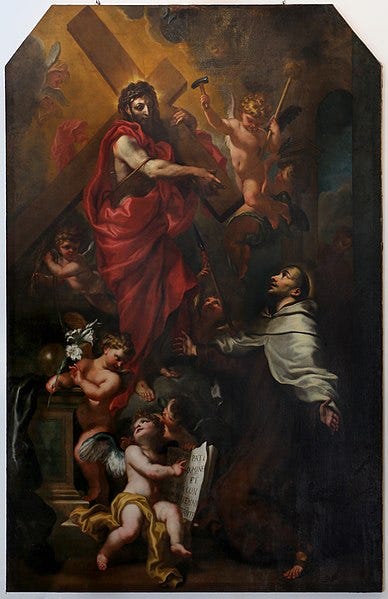
As I read the poem repeatedly, it struck me that his “dark night” isn’t what so many people seem to refer to when they speak of a dark night of the soul—not somber, not sad. Instead, there’s deep delight in the darkness. It’s good and necessary. There is no whisper of danger or threat. Instead, the darkness is a place of discovery and a space of sacred belonging.
It’s a wonder that John of the Cross could describe the dark night this way. Born into a family of conversos—Jews in Spain who converted to Catholicism rather than be exiled—he grew up in poverty. His father died when he was young. As a weaver, his mother didn’t make enough money to provide for her three sons, so John was sent to a boarding school for the poor. After joining the Carmelites, he became a student of Teresa of Ávila; she held him in such high esteem that, in 1572, she summoned him to become the confessor of the monastery where she was prioress.
He and Teresa sought to reform the Carmelite order, devoting themselves to poverty and prayer. They became known as Discalced (”barefoot“) Carmelites, because they ditched their shoes as a physical sign of their commitment. Their reforms infuriated other Carmelites, who imprisoned and tortured John. “His prison cell, a stone room barely large enough for his body, had formerly been a latrine,” Mirabai Starr writes in her essay “Exquisite Risk.” “Several times a week, the brothers brought him out to be flogged while they enjoyed their midday meal. Otherwise, he sat in the darkness, tracking the stars through the single small window, high up in the wall of his cell.”
In captivity, the poem came to him—a confession of faith from a man who had no faith left. It seems important to note that the treatise came later, after he’d had time to contemplate his imprisonment. Learning doesn’t happen all at once. Even a holy man like John needed years to understand his yearnings.
As I read the poem repeatedly, I felt myself longing for the sort of darkness that John of the Cross writes about. Though I doubt I could survive what he did, I wonder whether, in that darkness, I might find the clarity that I crave—not certainty, mind you, but clarity. In that darkness, where only a pure and true light can be perceived, perhaps the shiny objects of this life would lose their sparkle.
Sometimes I wonder whether God—or at least our imagined versions of God—might be just such a shiny object. To encounter God, we think, is to find one’s bliss, whether in the rapture of a raucous worship set or in the thrall of righteous ideas, in an absolutely correct reading of Scripture or in the feverish frenzy of social-media proclamations. But as Barbara Brown Taylor writes in Learning to Walk in the Dark, John of the Cross “does not try to teach by saying what God is, since positive statements about God serve chiefly to fool people into believing that their half-baked images of God and their flawed ideas about how God acts are the Real Thing. John works in the opposite direction. He teaches by saying what God is not, hoping to convince his readers that their images of and ideas about ‘God’ are in fact obstacles between them and the Real Thing.”
I don’t know what the Real Thing is when it comes to God. Perhaps the work of this life is to stumble around in search of it. If so, there’s solace in the historical record, which tells us that we aren’t the first to try and fail and try again. John of the Cross inspired numerous writers and artists, including some on the outskirts of polite religion: Flannery O’Connor, Ernest Hemingway, Salvador Dali, who based his 1951 painting Christ of Saint John of the Cross on a drawing by John that views the crucified Christ from above. His teachings were a touchstone for Thomas Merton too. “The earthly desires men cherish are shadows. There is no true happiness in fulfilling them,” Merton writes in The Ascent to Truth, which examines and builds on John of the Cross’s teachings. “Why, then, do we continue to pursue joys without substance? Because the pursuit itself has become our only substitute for joy. Unable to rest in anything we achieve, we determine to forget our discontent in a ceaseless quest for new satisfactions.”
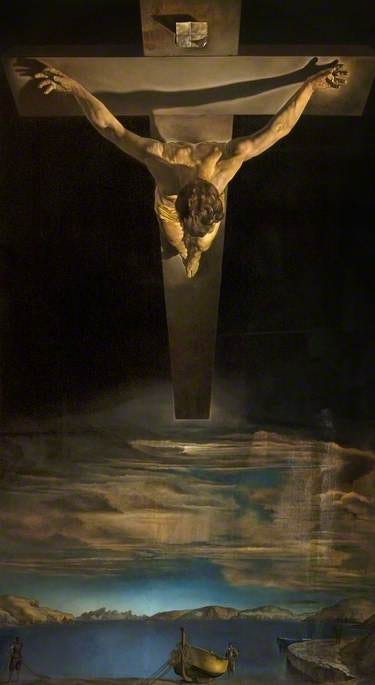
John of the Cross would probably be the first to rebuke anyone who tried to find new satisfaction by lionizing him and his teachings. His writing can be hyperbolic, he’s probably overly fond of the word “misery,” and his linear framing of spiritual deepening (“ladder,” “progress,” etc.) sits uneasily with me. Still, I love his insistence that God never leaves us. I love that he takes great pains to clarify that, while he writes about the spiritual self, he’s no isolationist; true humility, he writes, “grows the love of our neighbor.” The soul “now esteems them, and no longer judges them as it used to do, when it looked upon itself as exceedingly fervent, and upon others as not.” I love that he’s aware of the insufficiencies of his own arguments. I love that, even as he wanders around barefoot, he’s skeptical of public displays of piety; that might seem hypocritical to some, but to me it’s just endearingly human.
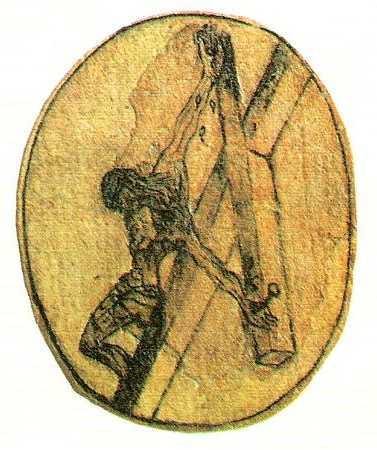
“As a traveler into strange countries goes by ways strange and untried, relying on information derived from others, and not upon any knowledge of his own,” John of the Cross writes in his treatise, “so in the same way the soul makes the greater progress when it travels in the dark, not knowing the way.” To travel this road is necessarily to rely on something beyond oneself. You might call that trust. You might even dare to call it faith.
What I’m Reading: Not unrelated to John of the Cross at all, the New Yorker has a stunning profile of the poet and scholar Christian Wiman. I confess I have never read any of Wiman’s work. But I found Casey Cep’s profile of him deeply moving. “Although Wiman is most moved by apophatic, or negative, theology, which seeks to understand God through all the things we cannot say about God, he believes that the one thing he can say for sure is that faith is inextricable from love. ‘There is in human love both a plea for, and a promise of, the love of God,’ he writes in his new book. Loving God is not possible, Wiman suspects, unless we love creation; easy when it’s your wife or your daughters, harder when it’s your father’s addiction or your own cancer. But he believes we are called to love it anyway, especially in absence and brokenness, even when it kills those we love, even when it might crucify us.”
Speaking of love of creation: From CBS News’s Tokyo bureau comes this moving story about a Japanese farmer who prices her produce way below market so that young people trying to make their way in the big city can afford it. “I want young people to feel that they're not forgotten, that they are treasured,” Tomoko Oshimo says. “I can make money anytime. Right now, I want to give young people a helping hand.”
What I’m Cooking: Last week a friend gave us a loaf of homemade sourdough. So Tuesday was grilled-cheese night. (Side dish: pan-roasted Brussels sprouts with maple and sriracha. We were being vegetarian, so I didn’t add bacon.) I did three kinds of sandwiches, though the cheese was all the same—a mix of cheddar and gouda. One had onion. The second, pear, made with Harry & David pears that another friend sent. (We have good friends.) The third had cranberry sauce, an experiment that worked better in my head than on my palate. Two out of three isn’t bad.
What I’m Listening to: This week I keep coming back to the mesmerizing work of Norwegian composer Ola Gjeilo. I’ve been listening to two albums in particular. First, there’s his gorgeously gentle Winter Songs. I especially love an instrumental piece called “Dawn.” If there were such a thing as an aural afghan, this is it for me; I feel so enfolded by the strings, the cello in particular.
The second is Northern Lights, a choral album that, purely by coincidence, features a song called “Dark Night of the Soul.” But my favorite song on that album is called “The Ground,” Gjeilo’s reimagination of a traditional Sanctus hymn.
I’d describe my spirits right now as a wintry mix. How about you? What can I be remembering in my thoughts and prayers for you? Please also remember that, if you prefer, you can email me at makebelievefarmer@gmail.com or even send me a note via owl, to P.O. Box 68565, Grand Rapids, MI 49516.
I’m so glad we can stumble through all this together, and I’ll try to write again soon.
Yours,
Jeff




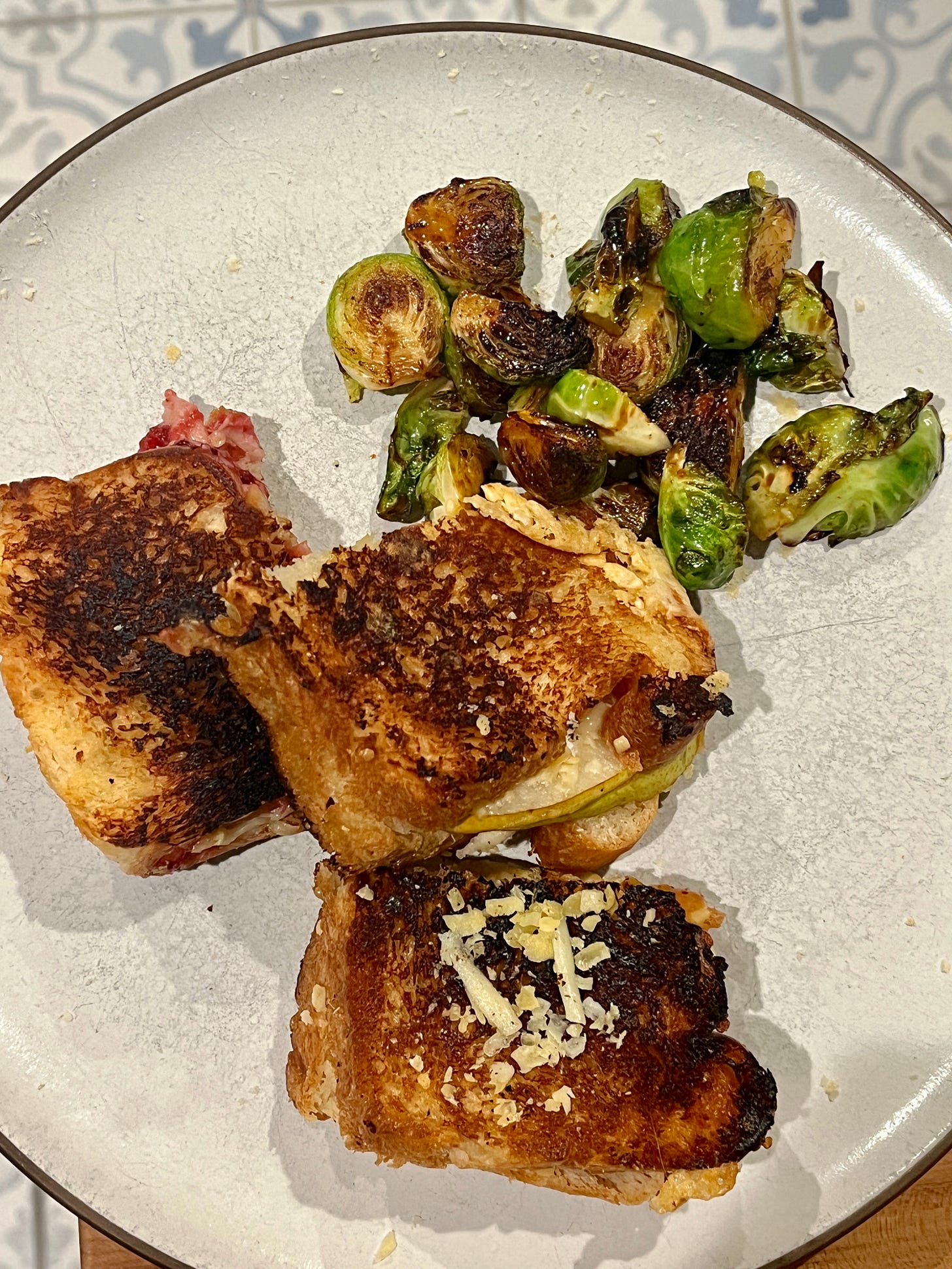
Several lines jumped out as I read-‘learning doesn’t happen all at once’ and ‘clarity not certainty’. I so spent my young days needing/wanting to know it all and then being embarrassed when I didn’t. This is not so much of a concern now.
And clarity not certainty! Pulling away in prayer, I want certainty and answers, but clarity of a situation is what my anxious heart needs.
Poetry also scared me a bit, but I have found Haiku as a way to ease into poetry. We had a Sunday school class where we meditated on a psalm and then wrote what spoke to us.
Thanks for your writing! It is so helpful.
I immediately looked up the story of the Japanese farmer who, although barely making a living herself, is generously and compassionately, giving to the young people in Tokyo. They need all the encouragement they can get because of high suicide rates, broken families, stressful job market, cost of living.
I see Christ in this woman, whether she knows Him or not. I might also say I am thankful my deconstruction permits me see Christ in this woman. It has not always been so.